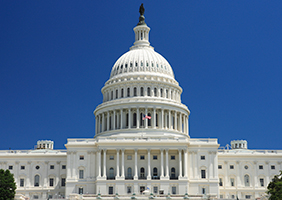Newsroom
RBC rule delay included in House foreign investment bill
 Language to delay the NCUA's risk-based capital (RBC) rule by two years was included in legislation introduced yesterday dealing with the Committee on Foreign Investment in the United States (CFIUS). The Foreign Investment Risk Review Modernization Act of 2018 (H.R. 5841) was introduced by Rep. Robert Pittenger, R-N.C. House Financial Services Committee Chairman Jeb Hensarling, R-Texas, was instrumental in getting the language added to the foreign investment bill.
Language to delay the NCUA's risk-based capital (RBC) rule by two years was included in legislation introduced yesterday dealing with the Committee on Foreign Investment in the United States (CFIUS). The Foreign Investment Risk Review Modernization Act of 2018 (H.R. 5841) was introduced by Rep. Robert Pittenger, R-N.C. House Financial Services Committee Chairman Jeb Hensarling, R-Texas, was instrumental in getting the language added to the foreign investment bill.
"NAFCU has been seeking relief for credit unions from the RBC rule since the NCUA finalized the rule," said NAFCU President and CEO Dan Berger. "We are pleased to see our relief efforts continue to gain traction as we seek to protect credit unions from the adverse effects of the rule."
U.S. Defense Secretary Jim Mattis has urged that CFIUS legislation be included in the National Defense Authorization Act (NDAA), which is currently under consideration in the House.
The language included in H.R. 5841 comes from the Common Sense Capital Relief Act (H.R. 5288), which was introduced by Reps. Bill Posey, R-Fla., and Denny Heck, D-Wash., in March. It would allow the NCUA to revisit and reconsider its approach to RBC by delaying the rule's effective date for two years to Jan. 1, 2021.
NAFCU supports an appropriate RBC system for credit unions. Over the past three years, the association has consistently opposed the NCUA's RBC rulemaking and has urged the rule be modified or effective date delayed because of the adverse effects it would have on the credit union industry – particularly as a result of regulatory burdens and costs.
Berger was on the Hill Wednesday meeting with key House members to secure support of the NAFCU-backed Economic Growth, Regulatory Relief and Consumer Protection Act (S. 2155) when it comes to a vote in the House next week.
Berger also recently noted a number of top legislative items still pending before Congress – risk-based capital reform, data and cybersecurity standards, field of membership reforms, and lawsuit abuse under the Americans with Disabilities Act – and asked leaders in the House and Senate to work with the association to address these issues to bring the credit union industry even more relief.
Share This
Related Resources
CFPB Reform Issue Brief
Whitepapers
NCUA Third-Party Vendor Authority One-Pager
Whitepapers
CFPB Recent Activity Issue Brief
Whitepapers
FCU Act Modernization Issue Brief
Whitepapers
Get daily updates.
Subscribe to NAFCU today.
